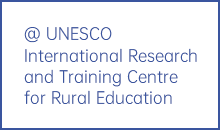Executive Summary
An initiative on Skills Development for Rural Transformation (described in short as Skills for All or SFA) is proposed to be launched by UNESCO- INRULED. The mandate of UNESCO-INRULED is to promote education and training for rural transformation, directing these efforts to develop skills and capacities in order to enhance employment, increase income and combat poverty, especially for disadvantaged rural people. In the context of global change and national circumstances, skills development patterns and processes need to be redesigned for better matching skills supply and constantly changing work requirements, especially for rural youth and women. The goal of sustainable livelihood consistent with human dignity and justice has to guide the skills development strategy and programmes. The justification and rationale for SFA are explained in the UNESCO-INRULED report Education and Training for Rural Transformation: Skills, Jobs, Food and Green Future to Combat Poverty (2012).
It is evident that the Millennium Development Goals (MDG) and Education for All (EFA) goals for 2015 will not be realised for significant proportions of the populations in the developing world, especially rural populations in Sub-Saharan Africa and South Asia. SFA will focus particularly on EFA goal 3 (ensuring equitable access for all young people and adults to ''appropriate learning and life skills programmes") and goal 4 (achieving a 50 percent improvement in adult literacy and "equitable access to basic and continuing education for all adults”). The rural people in developing countries remain particularly deprived in these areas - which is both a cause and a consequence of rural poverty. The emphasis in SFA will be to determine and support what can be done up to 2015 and beyond in order to lift the rural poor out of poverty.
The urgency has heightened for paying attention to rural transformation and making education the vehicle for this transformation. New sources of vulnerability for the poor, especially the poor people in the rural areas, have arisen. In the global market, economic crisis originating in the financial centres of the West affects poor people in the remote hamlet in Africa. There are new threats to food security of people. Man-made and natural disasters including effects of climate change endanger life and livelihood of millions. These hazards affect disproportionately the rural people, because most of the poor are rural people.
Rural areas are diverse and are in a state of transition. It is essential to turn the continuing and inevitable transition of rural areas, often with adverse consequences on the rural economy, environment and people's life, into an active and positive process of transformation of rural communities. The educational and skills development programmes have to become a vital part of this transformation through committed partnerships of the government, communities, businesses, and civil society. The paramount need, largely neglected so far, is to adapt, adjust and re-direct skills development priorities, strategies and resources to the rural people guided by a sustainable livelihood approach.
The overall goal of SFA is to build skills and capacities of rural youth and women which empower them to improve their living condition and life prospects, and play their role in rural transformation and in shaping a national development model guided by equity, justice, human dignity and harmony with nature.
This overall goal is reflected in five SFA objectives:
1.Facilitating the development of national policies of skills development for youth and adults within the framework of rural transformation goals and strategies in national development;
2.Promoting the exploration of policy and operational implications of the sustainable livelihood approach for skills and jobs creation that empowers and strengthens the agency of rural communities and people, ensures food security, enhances green development and helps combat rural poverty;
3.Undertaking collaborative action researches with national institutions and agencies in aspects of skills development for rural transformation (SFA) in the Asia-Pacific and Sub-Saharan Africa regions;
4.Organising workshops and training for planners, managers, trainers, facilitators, and researchers and other personnel related to SFA missions and activities; and
5.Designing teaching and learning materials as well as technical guides and manuals, applying the sustainable livelihood approach, related to:
• Education and training;
• Governance;
• Tolerance and conflict resolution;
• Environmental conservation;
• Food security;
• Health;
• Income-generation and employment opportunities;
• Microcredit and social business as part of poverty alleviation strategies;
• Social protection for the vulnerable; and
• Planning, managing, monitoring and evaluation of SFA activities.
UNESCO-INRULED will:
• Work collaboratively, in partnership with participating countries, agencies, and institutions in developing action research projects in skills development for rural transformation in the specific developmental contexts and needs in countries, applying the principles of sustainable livelihood;
• Support exploration and analysis of options in policy and strategy for rural transformation, national development implications, and skills and capacity building for rural transformation;
• Participate in designing skills development and training packages, manuals, and materials and national capacity building for this purpose;
• Help develop tool kits on the design, deliver* and implementation of training programmes to improve skills and advocacy among communities;
• Identify, develop, and monitor networking, best practices, strategies, and skill improvement;
• Promote generation of resources through international cooperation and at national level for SFA activities.
Participatory and collaborative monitoring and evaluation will be an important feature of SFA activities which will be encouraged and supported by UNESCO-INRULED through capacity building. Genuine sharing of responsibilities will be emphasised in each participating country by setting up national and local bodies such as community and parents associations where the stakeholders would ensure that their interests are addressed in the projects. Government agencies at different levels, NGOs and community organisations are seen as key actors in the implementation of SFA.
WANG, Li PhD
UNESCO International Research and Training Centre for Rural Education (INRULED) Beijing, China
May 2012
- Download:
- Skills for All.pdf













